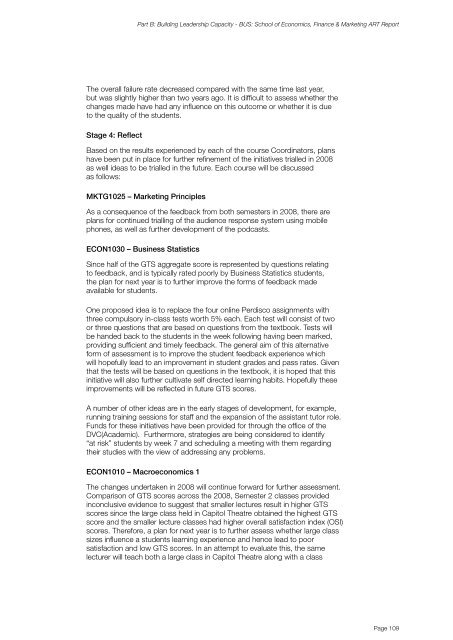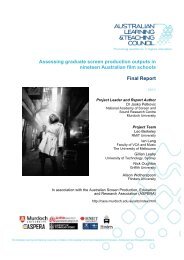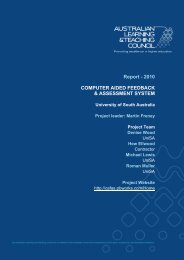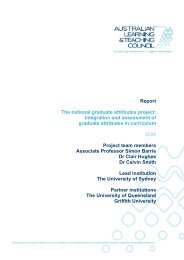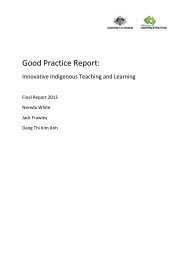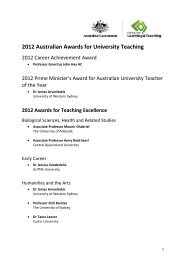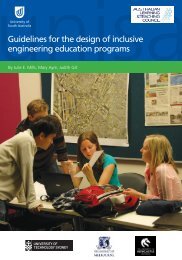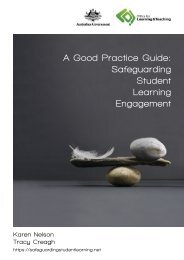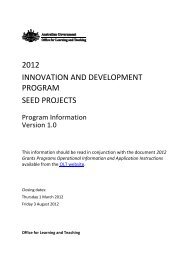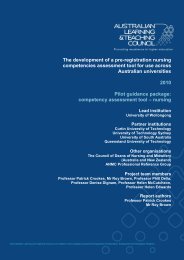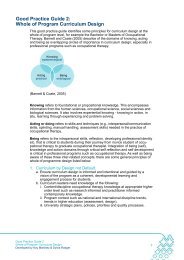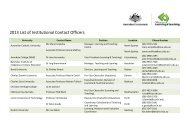student feedback and leadership - Office for Learning and Teaching
student feedback and leadership - Office for Learning and Teaching
student feedback and leadership - Office for Learning and Teaching
Create successful ePaper yourself
Turn your PDF publications into a flip-book with our unique Google optimized e-Paper software.
Part B: Building Leadership Capacity - BUS: School of Economics, Finance & Marketing ART ReportThe overall failure rate decreased compared with the same time last year,but was slightly higher than two years ago. It is difficult to assess whether thechanges made have had any influence on this outcome or whether it is dueto the quality of the <strong>student</strong>s.Stage 4: ReflectBased on the results experienced by each of the course Coordinators, planshave been put in place <strong>for</strong> further refinement of the initiatives trialled in 2008as well ideas to be trialled in the future. Each course will be discussedas follows:MKTG1025 – Marketing PrinciplesAs a consequence of the <strong>feedback</strong> from both semesters in 2008, there areplans <strong>for</strong> continued trialling of the audience response system using mobilephones, as well as further development of the podcasts.ECON1030 – Business StatisticsSince half of the GTS aggregate score is represented by questions relatingto <strong>feedback</strong>, <strong>and</strong> is typically rated poorly by Business Statistics <strong>student</strong>s,the plan <strong>for</strong> next year is to further improve the <strong>for</strong>ms of <strong>feedback</strong> madeavailable <strong>for</strong> <strong>student</strong>s.One proposed idea is to replace the four online Perdisco assignments withthree compulsory in-class tests worth 5% each. Each test will consist of twoor three questions that are based on questions from the textbook. Tests willbe h<strong>and</strong>ed back to the <strong>student</strong>s in the week following having been marked,providing sufficient <strong>and</strong> timely <strong>feedback</strong>. The general aim of this alternative<strong>for</strong>m of assessment is to improve the <strong>student</strong> <strong>feedback</strong> experience whichwill hopefully lead to an improvement in <strong>student</strong> grades <strong>and</strong> pass rates. Giventhat the tests will be based on questions in the textbook, it is hoped that thisinitiative will also further cultivate self directed learning habits. Hopefully theseimprovements will be reflected in future GTS scores.A number of other ideas are in the early stages of development, <strong>for</strong> example,running training sessions <strong>for</strong> staff <strong>and</strong> the expansion of the assistant tutor role.Funds <strong>for</strong> these initiatives have been provided <strong>for</strong> through the office of theDVC(Academic). Furthermore, strategies are being considered to identify“at risk” <strong>student</strong>s by week 7 <strong>and</strong> scheduling a meeting with them regardingtheir studies with the view of addressing any problems.ECON1010 – Macroeconomics 1The changes undertaken in 2008 will continue <strong>for</strong>ward <strong>for</strong> further assessment.Comparison of GTS scores across the 2008, Semester 2 classes providedinconclusive evidence to suggest that smaller lectures result in higher GTSscores since the large class held in Capitol Theatre obtained the highest GTSscore <strong>and</strong> the smaller lecture classes had higher overall satisfaction index (OSI)scores. There<strong>for</strong>e, a plan <strong>for</strong> next year is to further assess whether large classsizes influence a <strong>student</strong>s learning experience <strong>and</strong> hence lead to poorsatisfaction <strong>and</strong> low GTS scores. In an attempt to evaluate this, the samelecturer will teach both a large class in Capitol Theatre along with a classPage 109


